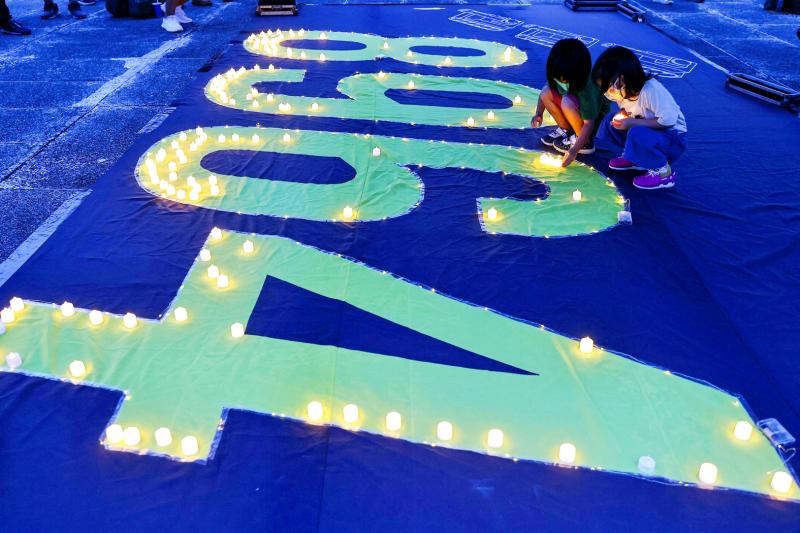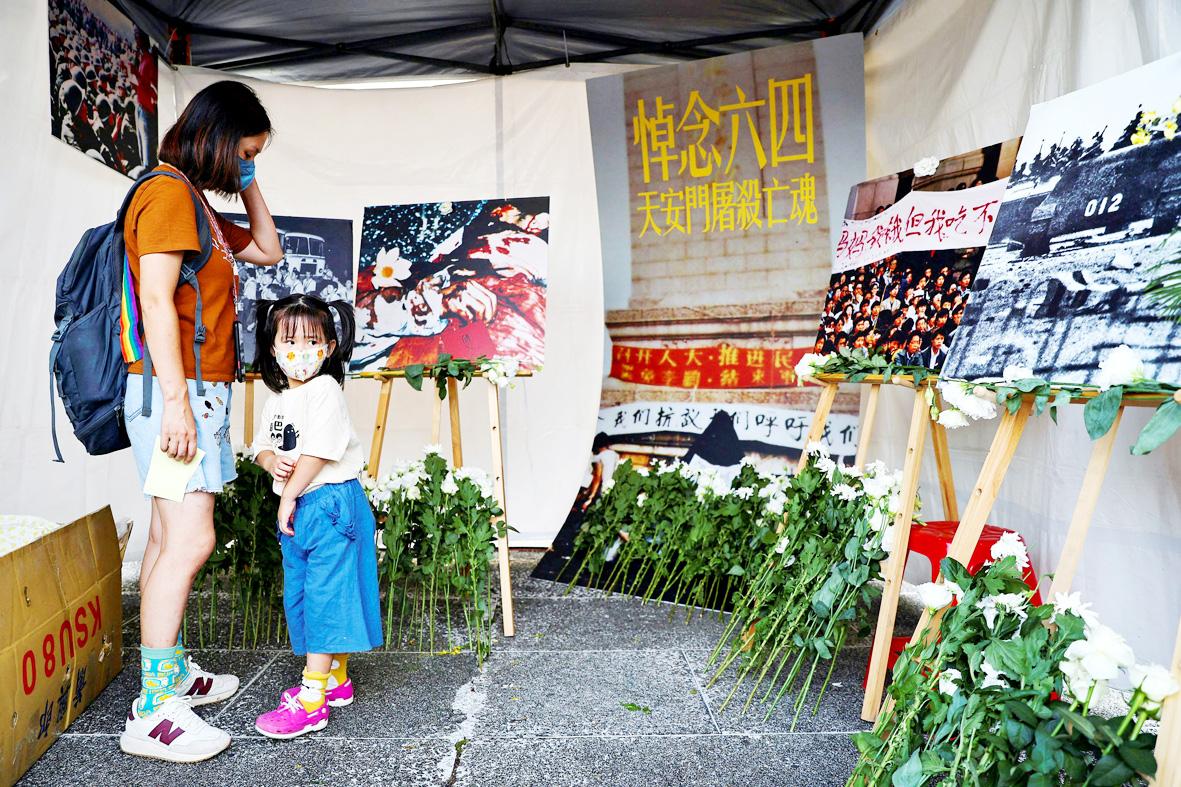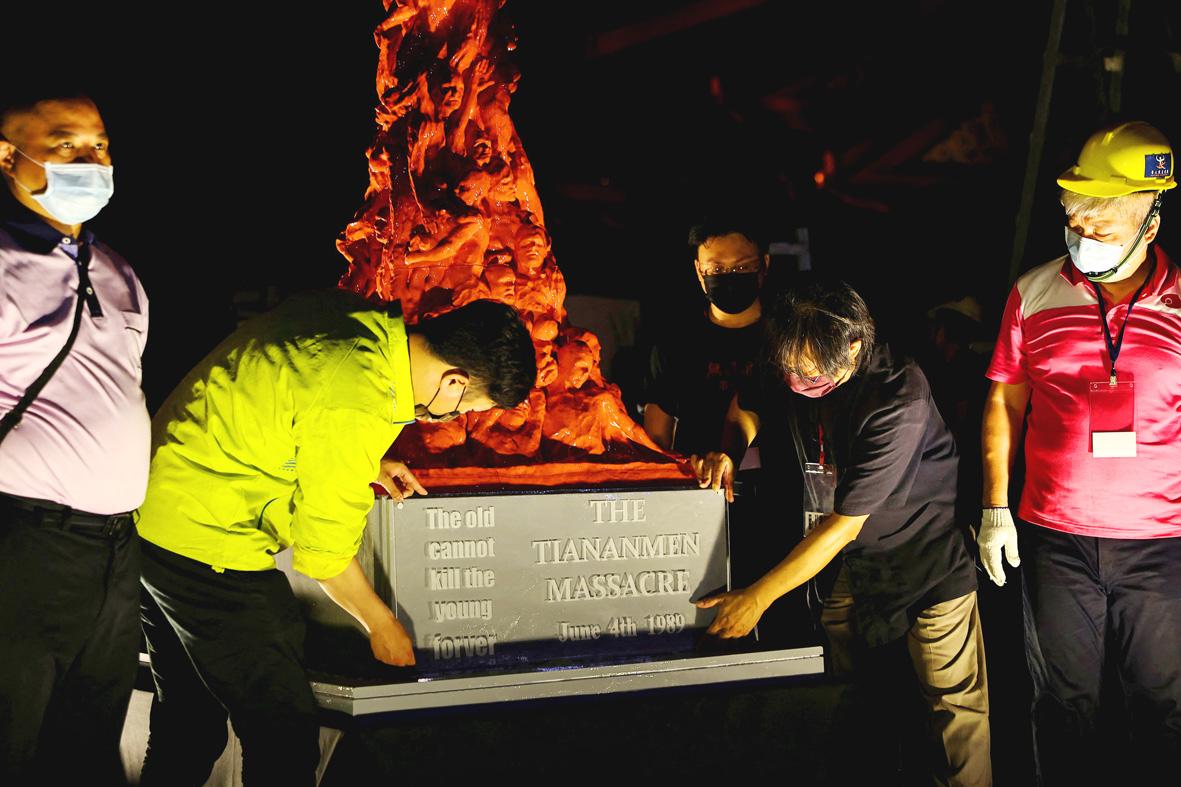Activists from Hong Kong and Taiwan have expressed hope that in the future Taiwan will keep alive the memory of the 1989 pro-democracy movement in Beijing after Hong Kong’s decades-long tradition of hosting the world’s largest annual candlelight vigil was banned for the third consecutive year Saturday.
However, several activists keenly involved in organizing the memorial every June 4 in Taiwan to commemorate the victims of China’s military crackdown on the student-led movement in Tiananmen Square, said that great effort would be needed for the issue to take root locally.
As in the past, the main June 4 memorial event in Taiwan took place at Liberty Square in front of Chiang Kai-shek Memorial Hall in Taipei, Saturday night. It marked the 33rd anniversary of the event and attracted several hundred people.

Photo : REUTERS
The turnout for the event has varied over the years, according to some organizers.
There is usually at least a few hundred people, but the crowd swelled to around 3,000 in 2019 and 2020 after mass protests in Hong Kong against an extradition bill, which was later suspended, attracted the attention of the world, the organizers said.
In Hong Kong, on every June 4 since 1990, tens of thousands of people have turned Victoria Park into a sea of candles until the event was banned in 2020 by the authorities, citing COVID-19 concerns, which critics said was a pretext to snuff out the local pro-democracy movement.

Photo : REUTERS
However, not only has the symbolic vigil been banned, the National Security Law imposed by Beijing on Hong Kong in June 2020 intensified efforts to eradicate Tiananmen-related memories.
Since then, there have been reported cases of vigil organizers being disbanded, people arrested for carrying flowers to mark the anniversary, churches canceling Tiananmen memorial Mass, and the city’s June 4th Museum forced to close and access to its Web site blocked.
As freedoms in Hong Kong have been curtailed, some activists have expressed hope that Taiwan will “pick up the baton” and become a new stronghold for Tiananmen commemorations.

Photo : REUTERS
DEEPER MEANING
Despite its small scale, the June 4 memorial in Taiwan still means a lot to Hong Kongers living in the country.
Being here on remembrance day for the victims of the Tiananmen Incident “added another layer of meaning for Hong Kongers this year,” because they were not allowed to do so in Hong Kong, Francis, who moved to Taiwan last year, said at Liberty Square Saturday.
Francis said she didn’t feel as compelled to attend the June 4 vigil in Victoria Park when she was in Hong Kong as she does now in Taiwan.
“Now I want to show the world that Hong Kongers remember June 4,” she said.
Stella, who migrated to Taiwan in 2020, said attending the June 4 commemoration in Taiwan made her feel as if she is still in Hong Kong. “It also reminded me that I am from Hong Kong,” she said.
Like Francis, Stella said she was not enthusiastic about joining the June 4 vigil when in Hong Kong, adding that since the Umbrella Movement for universal suffrage emerged in 2014, some pro-democracy groups in Hong Kong also gradually distanced themselves from the vigil.
“Because we didn’t think China would embrace democracy. As Hong Kongers, we felt that our priority was fighting for democracy in Hong Kong,” she said.
Lam Wing-kei (林榮基), a former manager of Hong Kong’s Causeway Bay Books detained in 2015 for selling materials critical of China’s political elite, also observed the growing tendency for Hong Kongers to take a more “detached” view of June 4 commemorations.
“I used to be very concerned with China because of my national identification. But in recent years, I felt that there was not much difference I could make. Like many Hong Kongers, I also identified myself more with Hong Kong than China,” Lam, who moved to Taiwan in 2019, said.
In a similar vein, Lam has noted a lack of interest among the general public in Taiwan at commemorating the Tiananmen Square Massacre and in learning about its history.
The “shift of national identity” from China to Taiwan in many Taiwanese has made them aloof from what’s happening in China, Lam said. He has reopened his bookshop in Taiwan.
DIVIDED VIEWS
Although Taiwan’s democratization has fostered a growing Taiwan-centered consciousness of national identity, it is still divided when it comes to identification, which some activists said has influenced the extent to which Tiananmen-related issues resonate with society.
A few years ago, students involved in organizing memorial events for the June 4 incident preferred to focus on pushing for democratization in China, because they saw it as a favorable condition for unification between Taiwan and China, Thomas Tu (涂京威), an organizer, said.
Other students argued that aside from “vindication of June 4,” the main theme of the annual memorial, other issues to be highlighted should be human rights violations committed by the government of the Chinese Communist Party (CCP), Tu said.
“Gradually, those students became less interested in June 4 events. Some said they don’t identify with China, nor do they live under CCP rule. They didn’t see the point of calling on China to vindicate June 4,” Tu said.
Likewise, an activist under the pseudonym Liang Wei-yuan (梁偉源) said some June 4 event organizers have confronted questions regarding their involvement in such activities.
A question the Taiwan Association for Human Rights (TAHR) often gets asked when working on June 4 events is “why don’t you focus on issues about Taiwan?” Liang said.
Marking the June 4 anniversary at Victoria Park has been a significant force shaping the identity of people in Hong Kong, but it did not play a role in Taiwan’s democratization, said Wu Rwei-ren (吳叡人), an associate research fellow at Academia Sinica’s Institute of Taiwan History.
Because of the different historical memories of people in Hong Kong and Taiwan, compounded by the complexities associated with identification and cross-strait relations, it will be a very difficult task to keep the June 4 issue in the public eye in Taiwan, as in Hong Kong.
Activists will have to go to great lengths to develop discourse and convince society about the importance of commemorating June 4, Wu said.

In the March 9 edition of the Taipei Times a piece by Ninon Godefroy ran with the headine “The quiet, gentle rhythm of Taiwan.” It started with the line “Taiwan is a small, humble place. There is no Eiffel Tower, no pyramids — no singular attraction that draws the world’s attention.” I laughed out loud at that. This was out of no disrespect for the author or the piece, which made some interesting analogies and good points about how both Din Tai Fung’s and Taiwan Semiconductor Manufacturing Co’s (TSMC, 台積電) meticulous attention to detail and quality are not quite up to

April 21 to April 27 Hsieh Er’s (謝娥) political fortunes were rising fast after she got out of jail and joined the Chinese Nationalist Party (KMT) in December 1945. Not only did she hold key positions in various committees, she was elected the only woman on the Taipei City Council and headed to Nanjing in 1946 as the sole Taiwanese female representative to the National Constituent Assembly. With the support of first lady Soong May-ling (宋美齡), she started the Taipei Women’s Association and Taiwan Provincial Women’s Association, where she

Chinese Nationalist Party (KMT) Chairman Eric Chu (朱立倫) hatched a bold plan to charge forward and seize the initiative when he held a protest in front of the Taipei City Prosecutors’ Office. Though risky, because illegal, its success would help tackle at least six problems facing both himself and the KMT. What he did not see coming was Taipei Mayor Chiang Wan-an (將萬安) tripping him up out of the gate. In spite of Chu being the most consequential and successful KMT chairman since the early 2010s — arguably saving the party from financial ruin and restoring its electoral viability —

It is one of the more remarkable facts of Taiwan history that it was never occupied or claimed by any of the numerous kingdoms of southern China — Han or otherwise — that lay just across the water from it. None of their brilliant ministers ever discovered that Taiwan was a “core interest” of the state whose annexation was “inevitable.” As Paul Kua notes in an excellent monograph laying out how the Portuguese gave Taiwan the name “Formosa,” the first Europeans to express an interest in occupying Taiwan were the Spanish. Tonio Andrade in his seminal work, How Taiwan Became Chinese,